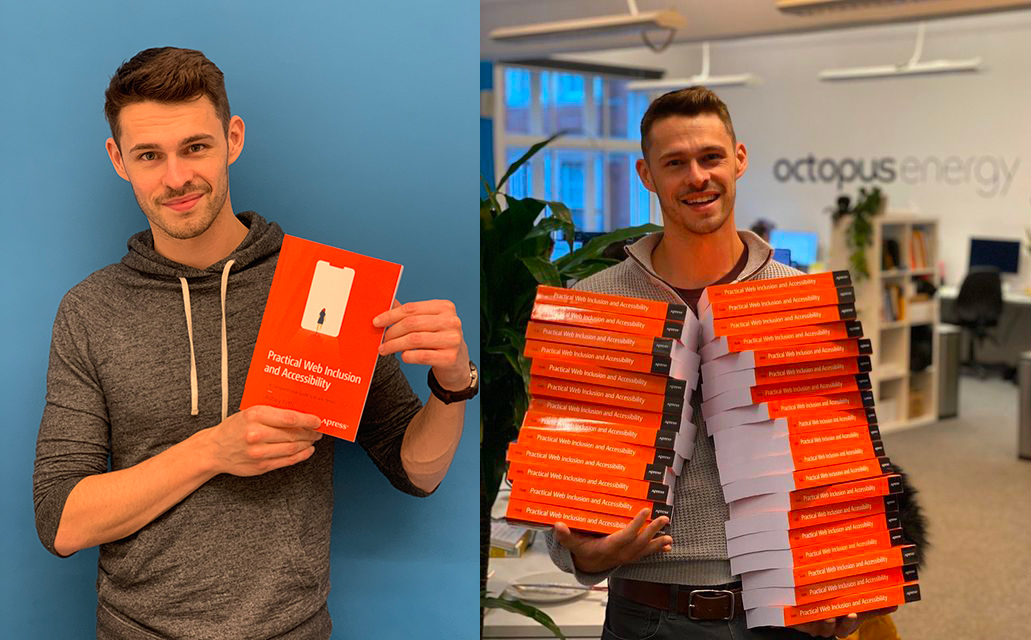After my last post about reflecting on five years at Octopus Energy, I received a lot of questions around its section on writing my book around my job. It’s been just over a year since its first publication, and about two years since the whole process started, so I wanted to take a little time to answer those questions in some more detail. It’s also quite fun to remind myself about some of the parts that I’d forgotten about (or intentionally blocked out…). Here are the questions I’ve been asked the most:
Where did you even start?
Fair question! For me it didn’t begin with “I really want/need to write a book”, it began with talking at the Festival of Marketing about the importance of web accessibility. This made for an interesting change as I didn’t just speak in technical terms to a technical audience like I’d done before in meet-ups or features - it was to a room of designers, project managers, marketers, and writers.
It was a challenge to take what had historically been a niche topic, usually only engaged with to satisfy regulations, and make it engaging enough to anyone who was involved in the creation or maintenance of a website. It became about why it’s important to cater for different access needs online, how it could in many instances be easy to achieve, and ultimately how those changes could positively impact the online experience of a much wider audience. I was effectively attempting to sell web accessibility to a wider audience who were, after seeing headlines about Beyoncé and Dominos Pizza being sued over their inaccessible websites, perhaps only learning about accessibility for the very first time.
It was after doing this, and receiving the reaction that I did, that I realised just how useful a book could be on this topic for people other than web developers. More than that though, after I got off stage, I really wanted to write it.
Cool, but where do you go from there?
It truly began with looking at how different publishers made their books and the process for getting in touch with them. I knew that Apress had a great reputation for publishing quality tech books, and Robin Hawkes, who I loosely knew from university, had written a book on HTML5 canvas for them a few years previously. This wasn’t a connection that got me “in the door” or anything like that, I just remember him describing the process as incredibly challenging but ultimately very rewarding, in no small part due to the way that Apress supported its authors. This was enough for me to check out how to submit a book idea to them. They have an online proposal form you can download, so I got started with that.
Initial book proposal
The very first title I had written down for the book was “Now & Forever: Web Accessibility”, which is very dramatic, but doesn’t really say too much about what’s going into the book. I also had the subtitle of “A comprehensive guide to online web accessibility for developers and designers” which is insanely long and leaves out a dozen or so disciplines who could also be interested. Overall I’m very thankful that Apress are better at naming things than me.
What’s in a book proposal?
You provide a brief overview of what your book will be about and contain, unique selling points, what readers will learn, target audience, and more. It’s basically a well-rehearsed elevator pitch. If you can’t answer these with relative ease, you don’t have a book concept yet!
You have to think about it commercially as well, which is admittedly not something I thought about prior to writing the proposal. You’re asked what “key words” (search terms) your book should be associated with and, most importantly, what’s already out there. You find as many books as you can that are close or adjacent to your idea, and then explain how yours is different. It’s scary. There are so many good books out there, written by talented and experienced authors, and you’re hoping you don’t find your ideas or unique selling points in a book you hadn’t noticed existed before.
They also ask you how long you think the book is going to be. I won’t lie, I didn’t have a clue when I wrote the following:
“I would estimate that it would be 50,000 words based on roughly 250 words per page for 200 pages.”
I pretty much pulled that number out of nowhere. It ended up being over double that size, and the publishers didn’t mind at all. Finally, they ask how long it’ll take you to write. I actually gave an initial timeframe estimate of 6-8 months to write the whole book, and ended up writing a book well over twice its size in 9 months. That’s quite mad to look back on, but it’s a reminder that things like this become more refined as you get into them.
My only advice here would be not to overpromise. It makes a lot of sense to try and predict these things, so it’s possible to have an idea of when it’d hit the shelves, but promising a book in half the time you’d like so you can secure a deal would be all kinds of awful.
Is the book the same as the one you pitched?
Yes! I had a chapter-by-chapter breakdown in my proposal containing fourteen chapters. I ended up with twelve, with a couple of instances of two smaller chapters being merged into one to keep consistent sizes. Nothing got cut from what I proposed which I’m really grateful for.
In terms of feedback, Apress helped me understand what they thought the market was missing, and what makes people buy tech books. These were really invaluable lessons, making me write in a way that ensured people were going to get value out of what I was telling them.
For the most part though, Apress followed my lead because they liked my idea, and that vote of confidence helped a lot.
Were you scared?
Oh yes indeed. Who wants to get a book deal and then completely tank it? That’s why I wanted to give it everything I had. That way, I could look back and tell myself that I’d made the best possible book I could.
Where did you find the time?
This is the most asked question by some way.
The very first thing I did was cut out social media. My phone has already been kind enough to tell me (numerous times) that I spent a good few hours a week on either Twitter, Reddit, or Instagram, so I started by removing the apps and the temptation. It was harder than I initially thought to be completely honest. I found myself picking up my phone only to find that the app I was naturally looking for was no longer there. There’s no big preachy message here about the time wasted on social media (I’ve returned to some of it since), it was just the natural first thing to go.
The next thing I had to do was cut my weekends in half. I gave myself every other weekend off, but the alternate weekend was where I got the bulk of my writing done. This wasn’t pleasant, particularly on the sunny, summer days when I knew my friends were somewhere soaking it in. I had to accept that, if something fun fell on one of these “work” weekends, that it was a shame but I couldn’t make it. This is because of how my mind works - I need to set a routine and stick to it, even when it’s unpleasant to do so.
Finally, I set up “shifts” throughout the week to carve out time, and they were deliberately in different environments. I had an early morning shift on Wednesdays in Common Ground, a coffee shop near to where my partner Charlotte used to live. We’d enjoy some breakfast together before work, she’d head off to her office, and I’d write like crazy for two hours before I started work. This was by far the most profitable shift for words but, because it usually came off the back of two coffees, it wasn’t always a guarantee that the words would make complete sense…or any sense. It was always a laugh to read it back. I also had a Tuesday evening shift straight after work. The office would quieten down after the day, I’d order in some food, and then I’d get to work with some music in the background until 9 or 10. I loved these shifts, because I was in an environment that was all about work and I was productive in. I could also travel home with some music in my headphones, with nobody around now that rush hour had finished and the pubs hadn’t kicked out yet, knowing that I’d done some good work.
This is a big thing, the whole process felt more like a battle to keep my head in the right place, rather than a battle to get words done. If I could keep myself feeling productive and positive about the progress that was being made, I could keep my mind off of the enormity of the challenge, or the long road left to travel.
Ironically this period was the most “structured” my time had been in years. I had clear start and end times for my work,, which would have helped me to have a better work/life balance…if I wasn’t using that time to write.
That’s equal parts great and rough. Tell me more about your routine
Sure thing! So a chapter needed to be written every two weeks to make the deadline for the full manuscript, so that was another reason why the routine needed to be strict.
The first week of every fortnight shift was “get words down at all costs”. I never concentrated on how it might all fit together, it was all about fleshing out every area of the chapter. The second week was then for editing, refining, and slotting the pieces into place to create a good flow throughout the content. Altogether it was a twelve day sprint each time - seven days for writing, and five days for editing and refining. The reward was then two days of relaxation and recovery before I started afresh for another chapter.
Then, two days before the deadline, I’d read the chapter through to see how it felt. Jackson my research assistant would do the same thing, and then we’d get together to chat through the changes. Finally, I’d get a non-tech person to read at least parts of the chapter to make sure that I was still accomplishing the goal of making the topic understandable.
Did it stick throughout the process?
Yep. I needed it to.
Did you take any time off?
One thing that really worried me at the time, but ended up being one of the best decisions I made during the process, was to take a holiday. When we were arranging the details of the contract, Apress shared a date that they thought would make the most sense to get it published and out into the world. We decided to work backwards from there time-wise, but it was a short turnaround.
My partner and I, Charlotte had already talked about visiting my friend in Vietnam and exploring the country, and I wanted to make that happen given all of the other things I likely wouldn’t be able to make over the course of the year. Because of that, I factored in a three week holiday right after the first chapter would be submitted. The thinking was that we could go there knowing that I’d made some progress, fully aware of what needed to be done when we got back, but without the great unknown of what it would be like to write a chapter and submit it for review. Furthermore, the first chapter was very different to every other chapter given that it was less technical, so it was the perfect candidate to be done separately.
The first couple of days when we arrived felt strange, because I struggled to get out of my head just how much needed to be done when I got back. That didn’t last for long though - Vietnam is just too beautiful. I came back completely refreshed, excited to get started, and I don’t think I’d have made it through in the same manner without it.
Did you have any help?
Absolutely. This was by no means a solo effort and, if it was, it wouldn’t have been anywhere near as good. Firstly, Apress have an amazing team. I worked with Louise Corrigan first who was my acquisitions editor. She was the first person at Apress I spoke to about writing the book, and we chatted through everything from how it might be structured to what was already in the market. Later on I worked with Nancy Chen and James Markham, who were my co-ordinating and technical editors respectively. Nancy was always making sure I was on schedule and had what I needed, and James helped me understand what’s needed in a technical book and how to structure it in a way that meant people could easily refer back to in future.
They also brought in a technical reviewer. They do this for every book, and it’s always an expert in that particular field to ensure quality and general sense. Mine was Katherine Joyce, who was so unbelievably thorough and insightful that I found myself thanking Apress every chapter that they’d brought her in. It was invaluable to have a pair of eyes looking at each chapter for the very first time as a complete piece of work, because they’re removed from the process and it forced me to defend my approach.
Finally there was Jackson Howarth. One of my favourite humans in the world. When I first agreed to write the book, I spoke to Octopus about how the balance between book and work might look. I wanted to write it myself, and didn’t want to compromise on that at any point. At first I thought that might mean that I’d need to take some time off, but Octopus didn’t like that idea and, on reflection, neither did I. I love my work and my team and I didn’t want to leave that alone. In the end, the compromise was to find someone that would help sharpen the content I’d written, and aid with the time-consuming tasks that weren’t writing the book, like deeper dives into research areas I identified, and transcribing interviews I had with people in the industry.
More than that though, Jackson was a calming influence and a source of positivity in one of the craziest periods of my life. I had someone I could talk to about the book and not Octopus work, and someone to help separate the two jobs and draw a line between the two brains. He probably doubled as my therapist somewhere between June and October 2019. What a guy.
I’ll also always be grateful for that support from Octopus. I’d like to think that I paid it back by not only balancing the two so that there wasn’t front-end work that was failing to be done, but in finding someone as awesome as Jackson that they stayed with us as a staff writer to this day - long after the book was done.
How did you feel when it was done?
Very, very strange. I was in the tiny room I’d been working in for the last few chapters. After submitting them all as first drafts, the process ended with tweaking them all based on feedback, and sharpening them into the finished article. When the final ones had been submitted and approved, I just slumped onto the floor in the corner of the room. I stayed there for around 15-20 minutes - but it felt a lot longer. It just didn’t feel real - it was a sense of relief I hadn’t felt before.
For a while, time spent relaxing actually made me feel guilty - it was as if there was something really pressing I should be doing with my time instead of just resting. It took about a week for it sink in and for me to actually start enjoying my time off. Even then though, there was something surreal about it. It felt for ages like something would suddenly happen to derail its release, like a production issue, or the publishers deciding the time wasn’t right. I knew the feeling wouldn’t go away until I actually held the book in my hand, but in the meantime I got better at slowing down the pace of my life and shaking off the rigorous routine that had been in place for most of the year.
Do you remember the highest and lowest points in the process?
I definitely remembers the highest, and have only vague recollections of the lowest.
Lowest
Writing the first chapter
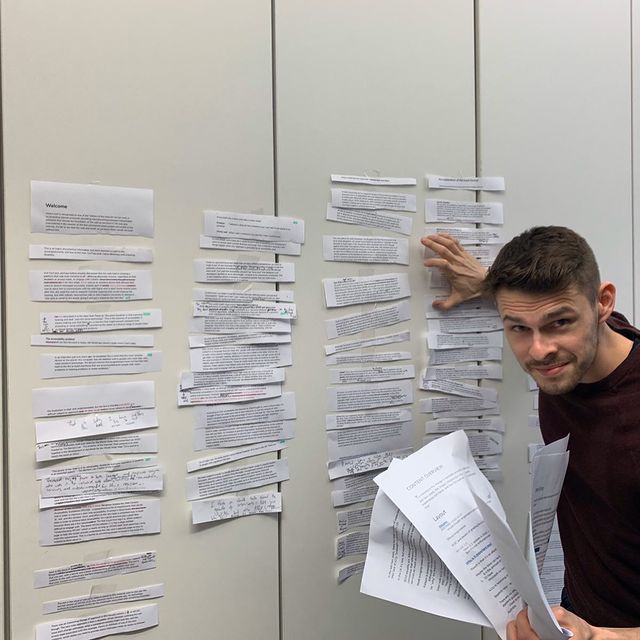
This was terrifying. The first chapter needed to set the tone for the whole book, be compelling enough to keep people reading it, and (in the back of my mind) convince Apress they hadn’t made a huge mistake. I’d written essays and a dissertation before, but this felt totally different. I can look back now and say it’s definitely one of my favourite chapters, but I honestly agonised over every word and the order of them. I even went to the extent of printing off the first draft, cutting it up into pieces, and sticking it to a wall in the office with Jackson. We only used this process for this chapter, because I think doing it once helped him understand how I thought and helped us understand how to work together.
Even after it was submitted, I still felt uneasy - plus I was staring down the barrel of eleven more chapters.
The monotonous middle
The second low point I can remember is midway through the process. The initial adrenaline from the start had gone, and I wasn’t quite near enough to the finish line to start getting excited about that either. The result is that you end up in a bit of a monotonous rut. You stop following dates: August 2019 wasn’t August 2019 - it was chapter 7.
During this time, Octopus had a couple of small separate working spaces that we were using for overflow as we grew, and I set up shop in one of them with my team. For months I spent more time in that room than in my flat, as sad as it sounds, but I was grateful that it provided some quiet and a different environment to the office. One of its unique features was a full blackboard wall, which helped a lot for drafting chapters, but eventually got a bit “shining-y”:
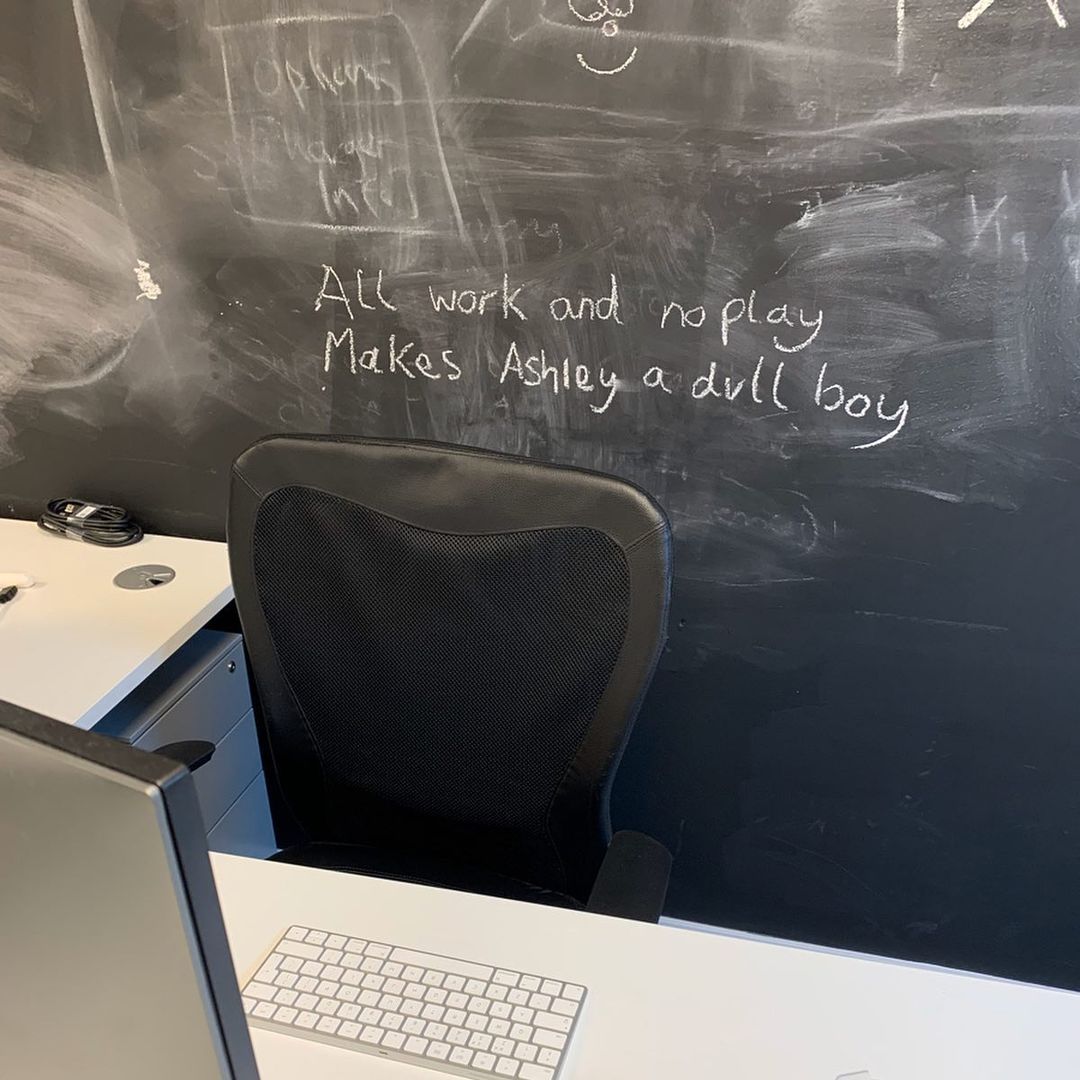
Highest
Writing the acknowledgements
This was actually one of the only things I wrote whilst in Vietnam, when only one chapter had been submitted as a first draft. It was really cathartic to remember all of the amazing people I have around me and to thank them properly, and it gave me some strength to come back to the UK with. I also thought (rightly) that I’d be too exhausted by the end of the manuscript to remember everyone and write it in the right style.
Holding the book in my hand
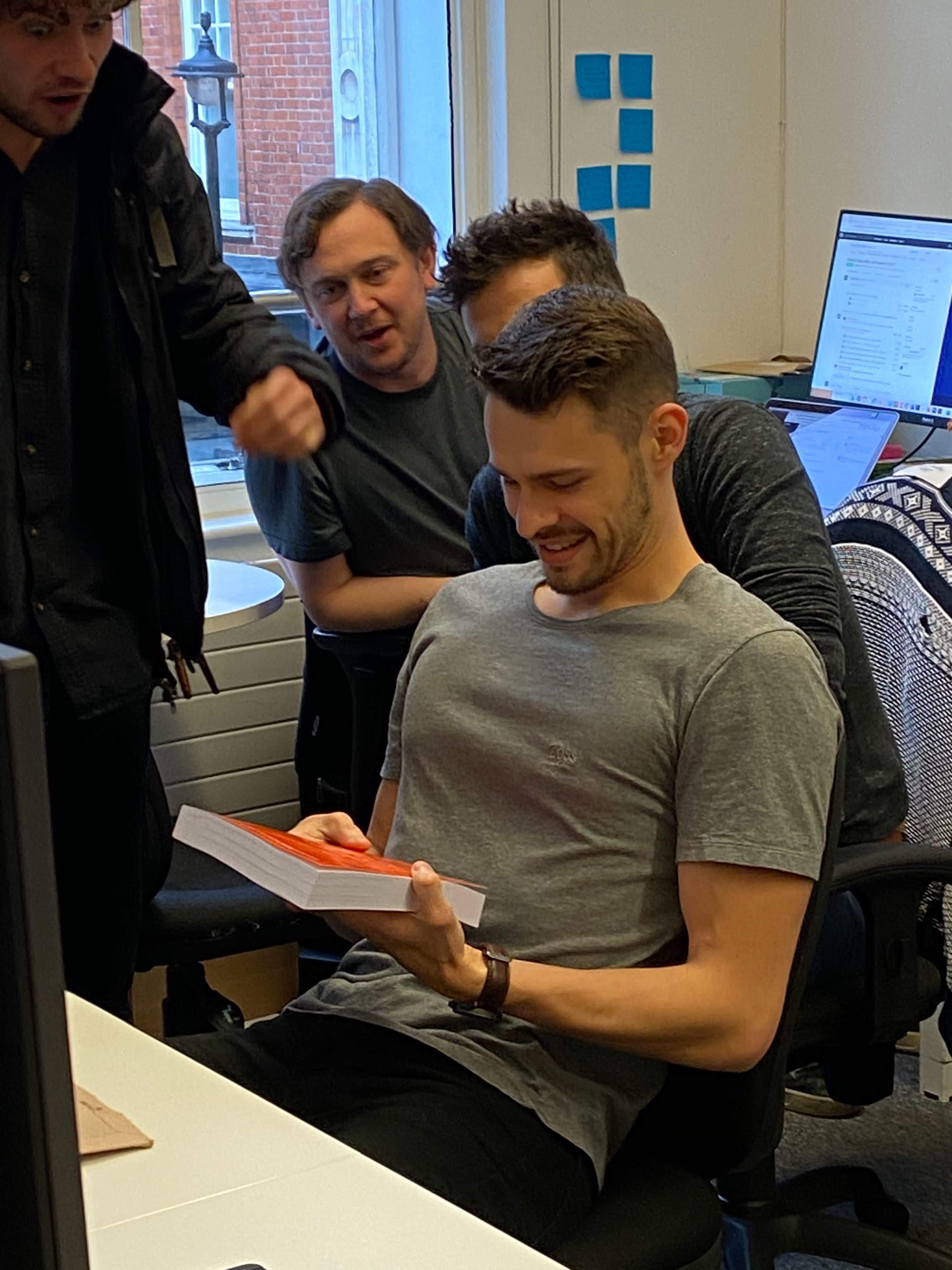
Ah, this moment. I always smile when I see this photo, because I can remember the moment vividly. I was worried that I wouldn’t get my hands on a copy before I flew off to Australia for Christmas (an invite from Charlotte’s family that came at the perfect time). There had been shipping issues with the advance copies Apress had sent me, and if I didn’t get it in the next couple of days, it’d be weeks before I saw it, and I’d be one of the last ones to have it. Thankfully they found a couple more to express ship to me, and it arrived at the office just in time. I struggled to do anything apart from look at it and touch it that day.
That photo above was also the birth of a company-wide meme, and it was based on Jackson’s face (top left).
Reaching number one
Writing a book is a great achievement, but it doesn’t guarantee that anyone will actually buy it or read it! I didn’t have any time to think about that throughout the process, but I became acutely aware of it ahead of the official release.
Now “Hot new releases in Web Scripting & Programming on Amazon” isn’t exactly “New York Times Bestselling list”, but given how niche the book is (and tech books in general), I was insanely hyped to see it hit number one.
It managed to stay in the top 50 for tech for two months after - which was lovely, and removed the final book worry left in my head. I even took a picture as proof it was real:
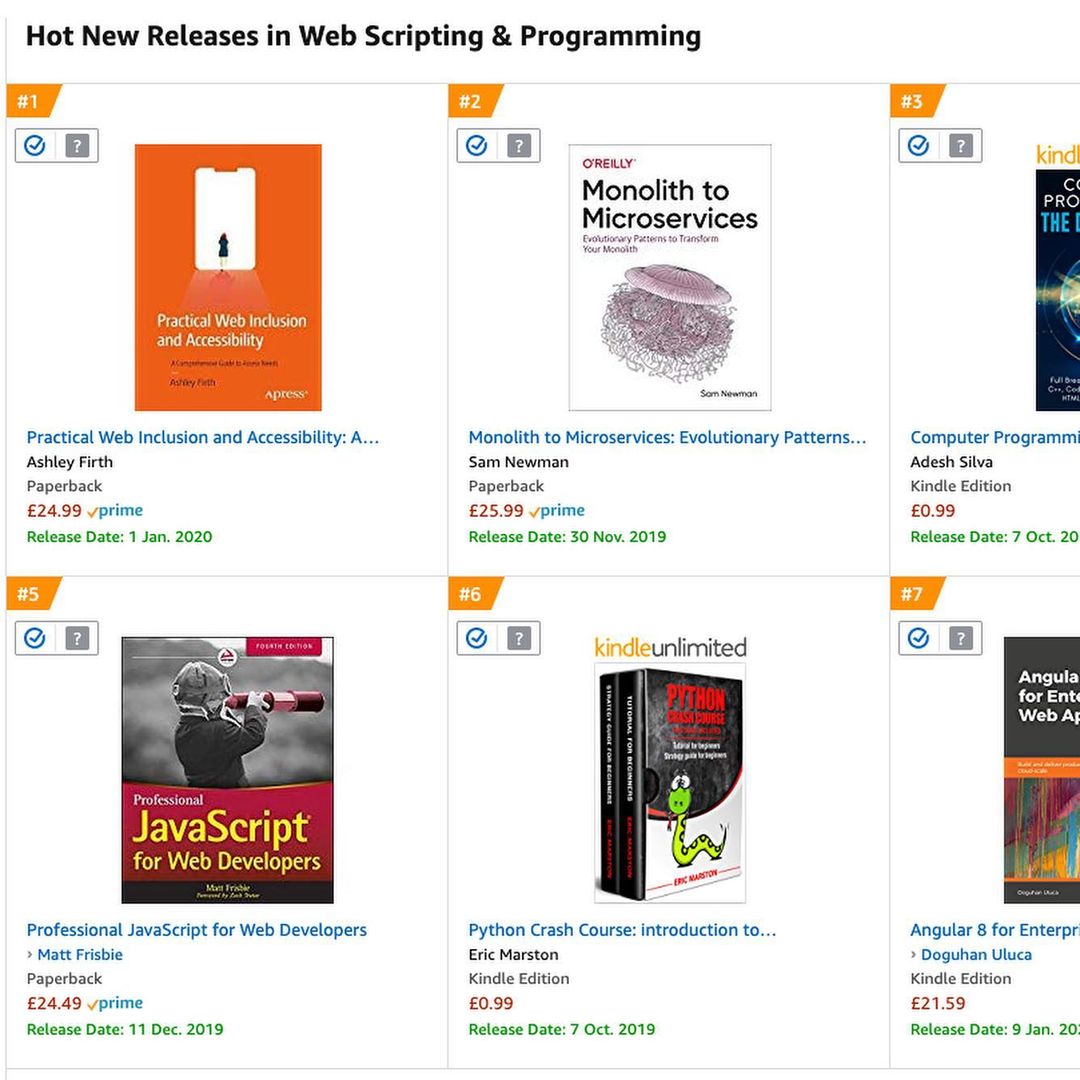
How was the cover designed?
It was designed by Pete Miller, in return for a bag of Skittles. I’m not kidding. I was set on having a custom cover for the book, but you needed to provide your own design that Apress would then review and approve or reject. If you didn’t supply one, it would be styled in their standard black and yellow design. They look great, but I wanted the book to stand out a bit more, especially as it was aiming at an audience that wasn’t just developers. Me and Pete went to the giant Waterstones in Piccadilly Circus and checked out the books that were there - what caught our eye immediately when we were browsing, what the most common book colours were and, more importantly, what colours weren’t there already. We found that bright, almost neon Oranges were few and far between, but always caught our eye when we walked past a shelf.
The design itself has to follow some typical conventions which I think is commonplace in most publishing houses - things like the font, position of author and publisher names etc. Apart from that though, Pete had free rein. I gave almost no guidance on what it would look like, because to be honest I didn’t have one in mind. I know that he toyed with a couple of concepts - one around a diverse range of people coming together to form a symbol associated with accessibility, and the one that eventually became the cover.

I’m such a fan of it. Super simple, clear attention on the illustration, and I always smile when I catch a glimpse of it. Great value for a bag of skittles.
Would you do it again?
Fantastic question. Everyone that’s asked me that between when the book was released and now has received the same answer: No.
There’s not much I’d be motivated to write about as much as accessibility in the tech space if I’m being honest, and a second version of this book would require some serious changes in the field to make it worthwhile.
More than anything though, the size and timeframe couldn’t be the same again. I learned a lot about myself during that process, and one of the biggest things is that it’d be unfair to myself and those around me to do it again under the same circumstances.
One thing’s for sure though - I do enjoy writing. Anything from tech books to silly reflective blog posts. I like the idea of trying to write fiction for the first time some day. We’ll see…
For now, “Practical Web Inclusion & Accessibility” is out in the world as my one and only book. A knackering 2019 with one hell of an ending, and one of my proudest achievements to date.
And would this blog be complete without a plug? Hell no! You can read more about the book at learna11y.com, or grab yourself a copy here.
